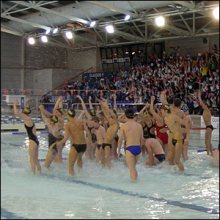From Michael Greenwell:
"The coverage of the reaction of the public to Glasgow winning the bid for the 2014 commonwealth games seemed to be coming from a different planet.
"The most common attitude I was getting from people was one of being massively underwhelmed[1] by the whole affair.
"What was absurd about it was that in workplaces all around the country arrangements were made to make sure the decision was broadcast immediately after it was made.
"In my own place of work there was a directive issued that all TVs had to be turned to the correct channel for the announcement. Similarly, bus and train stations had to make the announcement.
"What were they expecting ? Scenes of jubilation akin to VE day? People throwing each other in fountains and filling them with wine [tonic variety]?
? Scenes of jubilation akin to VE day? People throwing each other in fountains and filling them with wine [tonic variety]?
"I took a look out to the canteen where the TVs are in my place of work just to see what happened.
"NOT ONE person even noticed. They all just carried on eating their lunch.
"This is not the picture painted by the BBC which went into its full voice of the nation mode as it told us about scenes of jubilation that absolutely no one I know saw, joined in with, or even really cared about.
"They showed the above picture, saying that 2000 schoolchildren were there celebrating. I am prepared to bet that they were taken there by their schools who in turn were invited to do it by the city council as a photo op and were probably happier about the day off than anything else.
"The plan is to use the games as an opportunity to regenerate the east end of Glasgow. Whilst this is a decent goal in and of itself the history of regenerating that area has not been a particularly succesful one and the ability of events of this kind to provide useful developments for a city is overhyped.
"Lets take a look at the history…
"After World War 2 many European cities followed a particular path of regeneration. This was a necessity after the bombing and havoc wreaked by the war.
"Roughly put, the inner cities were cleaned up and gentrified. Many excellent buildings that could have been saved were knocked down and the poorer people who lived in many of these places were moved out into newly built housing schemes on the outskirts of the cities in question. This happened in many places.
"However, once moved to the newly built places many problems became apparent. Although the housing was built, appropriate facilities were not. There was a lack of jobs and those who had work usually had to go into the cities to get to them. This should not have been such a problem apart from the fact that it also took a long time to put working public transport links into the new areas.
"Furthermore, the new houses were not well built and soon fell into disrepair - if you walk around Glasgow now you will find that the 100 year old buildings are doing fine and look good and the majority of the ones built in the 50s and 60s are derelict or just about to be.
"It is in many ways opposite to the model in the USA in that in Europe the inner part of the city tends to be the most looked after and is often extremely beautiful whereas a lot of the suburbs are in disrepair. In the USA it seems to be the suburbs doing well and the inner cities in disrepair.
"The strategy adopted after WWII is still at the roots of many of the social problems that Europe faces. Many people have been moved out of town, disenfranchised and left in substandard housing in an area with no facilities. If you want to look at the reasons for things like the Paris riots then this is one of your starting points.
"Is this, or something similar, going to happen again in the east end of Glasgow? I hope not, but we will have to wait and see. Many terrible, pointless and frankly stupid things have been done in the name of ‘development’.
"It is also very likely that a few people will make themselves a lot of money out of the games but the impact on the city as a whole and the east end in particular will not necessarily be positive. Again, I hope the games do have a positive outcome for the city but I am not at all convinced they will."


